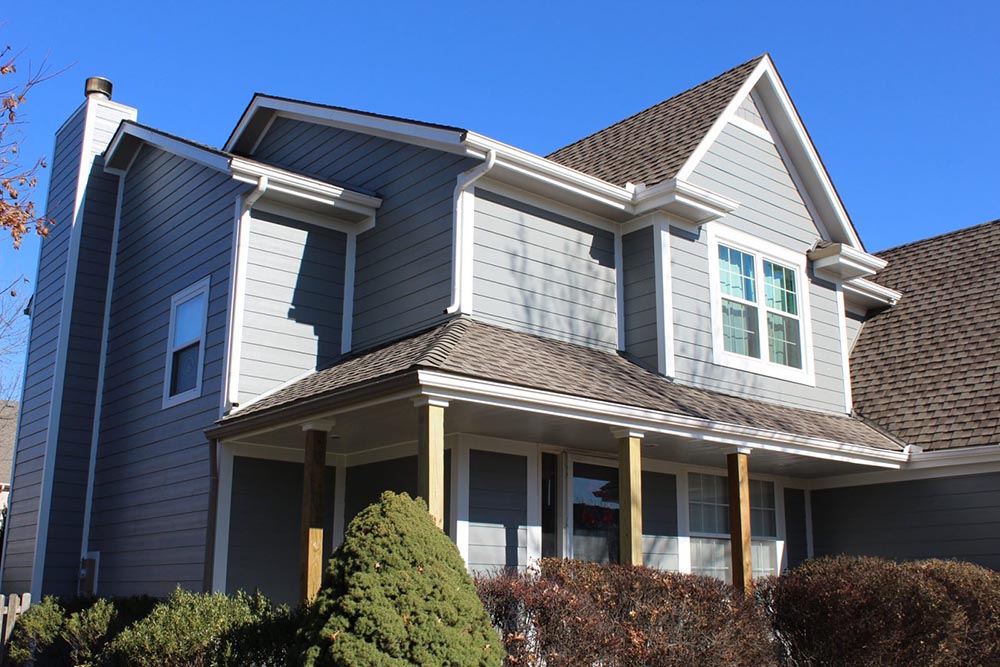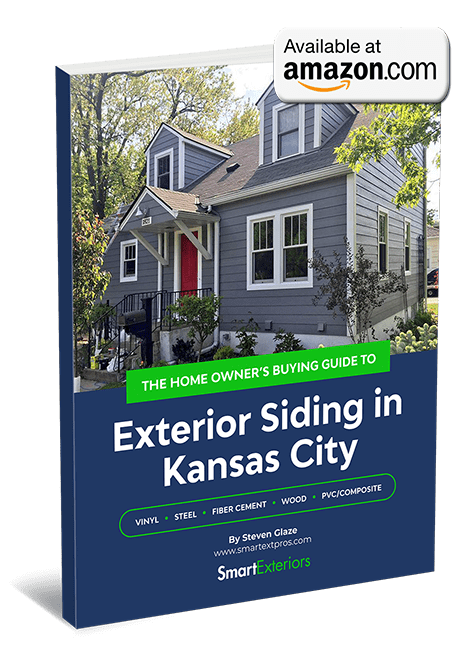A house is only as good as the whole of its parts. When a part fails due to old age or inferior quality, the performance of the house becomes compromised. One of the most important components for homeowners to pay attention to is the siding. The siding is responsible for keeping you and your loved ones protected. It also plays a crucial role in energy efficiency and the overall insulation of your home.
While there are a number of siding options available for homeowners in Kansas City, two of the most highly rated options are insulated vinyl siding and fiber cement siding. Despite their mutual popularity, both options are vastly different and offer various pros and cons to consider before making a choice between the two. At Smart Exteriors, we dedicate ourselves to finding the best options on the market and bringing them to homeowners in Kansas City. In this article, we’ll break down these two premium options and reveal which of them comes out on top according to our team of experts.
What is Insulated Vinyl Siding?
It may sound like it’s a completely different siding option than the ever affordable vinyl, but in reality, this siding is simply another type of vinyl siding. The main difference between the insulated version and the standard version is the solid rigid-foam insulation applied to the back of the vinyl panel. It works by filling the void behind the siding’s stepped profile. As such, the insulation ensures the finished product is stiffer and more resistant to movement or warping than regular vinyl siding.
Like regular vinyl siding, the insulated option has an outer skin made of polyvinyl chloride or PVC. Behind the PVC, lies an additional layer made of expanded polystyrene (EPS), which assists in the overall formation of the siding. It’s important to remember that the insulation can be installed at a thickness of 1.25-inch thick, but is usually installed in a much thinner measurement due to the stepped profile common with this siding. Professional contractors would install this material with nails just like they would with standard vinyl siding.
What is Fiber Cement Siding?
This material is relatively new compared to vinyl siding but has become exceedingly popular in recent years. Fiber cement siding is a siding option that is durable and designed to last a long time without causing a need for excessive maintenance. The material is classified as semi-rigid, thanks to its ability to provide much-needed protection while still offering a degree of flexibility.
As its name implies, this siding is made up of a few materials that include cement, sand, cellulose fibers, and water. However, it’s important to remember that different companies will add different additives or materials, which can change its composition. The best known an most popular brand of fiber cement siding is James Hardie siding. The company’s reputation for excellence is largely in part thanks to the company’s use of propriety additives known to further improve upon the performance of this innovative material.
Analyzing Pros and Cons of Both Materials
Like with any siding option, there are pros and cons to consider when evaluating siding materials for performance. For this reason, we have collected a list of the pros and cons of both options for your review.
Vinyl Siding
Pros
- Insulation: As its name implies, this siding option works wonders in providing insulating quality or R-value for homeowners.
- Durability: Compared to its standard cousin, this option is much more durable and is capable of withstanding greater wind speeds and more damaging impacts.
- Appearance: Due to its thickness, the siding is better able to maintain its appearance over time. Also, it provides a sharp profile that only enhances curb appearance for homeowners.
Cons
- Higher Installation Cost: While not as costly as some other materials, the cost increase from standard vinyl siding to insulated vinyl siding is significant.
- Installation Issues: Insulated siding requires more attention and expertise than regular vinyl siding. For this reason, improper installation is even more detrimental for this option than some other options.
Fiber Cement Siding
Pros
- Non-Combustible: This siding option doesn’t ignite even when exposed to fire, and won’t add fuel to a fire in case one breaks out.
- Environment Protection: Fiber cement siding is specially designed to withstand environmental concerns such as moisture or rot, unlike other materials.
- Multiple Climates: No matter the climate, fiber cement siding is a valid option for homeowners. It can handle the conditions of the coast and stands up to different types of weather ranging from blizzards to hurricanes.
- Pest Resistance: Pests such as termites, spiders, woodpeckers, and other animals have no desire to be around this material, which makes fiber cement a very nice pest barrier for your home.
Cons
- Installation Difficulty: This material requires someone trained and certified in fiber cement siding installation due to its heaviness. For this reason, DIY installation isn’t an option with this material. Also, when fiber cement is cut, it releases known carcinogens in the air, which is why trained professionals with the right equipment should handle this project.
- High cost: The heavyweight, professional installation requirement, and higher cost of this material can make this option less desirable for some. However, the long life of this material, exceptional ROI, and low maintenance requirements of fiber cement will mitigate the initial higher costs—making it more cost-efficient than vinyl options in the long run.
Making a Decision
At this point, you have a pretty good idea of what each choice has to offer. Now it’s time to make a decision. Fortunately, the siding industry is a heavily competitive one. This means that many siding options on the market will perform well. However, as with any home improvement material, some of them will outperform others and provide better and longer-lasting value for your home.
You’ll want to choose insulated vinyl siding if budget is a concern for you. While this option may cost more and is trickier to install than its standard counterpart (affordable vinyl siding), it costs less and is less difficult to install than fiber cement siding.
However, it’s best to choose fiber cement siding if durability and the ability to withstand weather is more of a concern. The Midwest is known to have extreme temperatures and weather. One day there could be hailstorms and the next day will be thunderstorms. Winter brings blizzards and ice storms. Fiber cement siding is more capable of standing strong against such weather changes.
At Smart Exteriors, we highly recommend James Hardie siding options for homeowners living in Kansas City. For more information about how fiber cement siding can improve your home’s look, performance, and overall value, our team of expert contractors is here for you. To get started with a free, no-obligation estimate, give us a call now or fill out our online form for more information.

